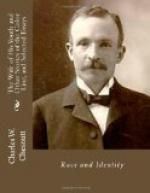There came a time, one day in spring, when there was no longer any question about it: uncle Wellington was desperately homesick.
Liberty, equality, privileges,—all were but as dust in the balance when weighed against his longing for old scenes and faces. It was the natural reaction in the mind of a middle-aged man who had tried to force the current of a sluggish existence into a new and radically different channel. An active, industrious man, making the change in early life, while there was time to spare for the waste of adaptation, might have found in the new place more favorable conditions than in the old. In Wellington age and temperament combined to prevent the success of the experiment; the spirit of enterprise and ambition into which he had been temporarily galvanized could no longer prevail against the inertia of old habits of life and thought.
One day when he had been sent to deliver clothes he performed his errand quickly, and boarding a passing street car, paid one of his very few five-cent pieces to ride down to the office of the Hon. Mr. Brown, the colored lawyer whom he had visited when he first came to the city, and who was well known to him by sight and reputation.
“Mr. Brown,” he said, “I ain’ gitt’n’ ’long very well wid my ole ’oman.”
“What ’s the trouble?” asked the lawyer, with business-like curtness, for he did not scent much of a fee.
“Well, de main trouble is she doan treat me right. An’ den she gits drunk, an’ wuss’n dat, she lays vi’lent han’s on me. I kyars de marks er dat ’oman on my face now.”
He showed the lawyer a long scratch on the neck.
“Why don’t you defend yourself?”
“You don’ know Mis’ Braboy, suh; you don’ know dat ’oman,” he replied, with a shake of the head. “Some er dese yer w’ite women is monst’us strong in de wris’.”




